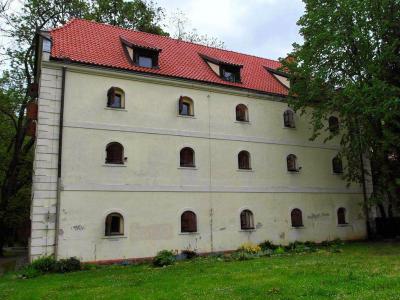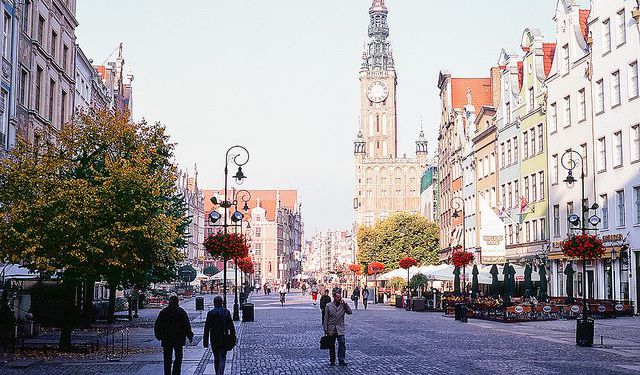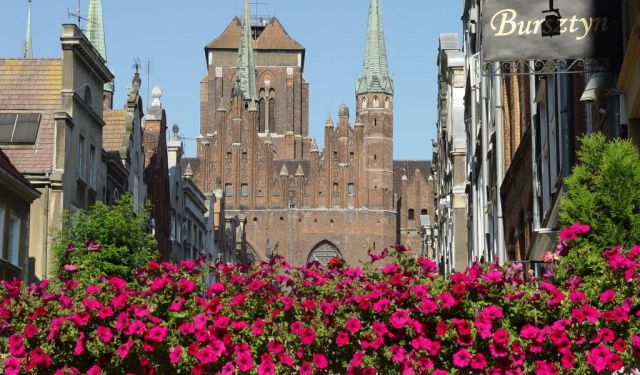Ethnographic Museum at the Abbatial Granary, Gdansk
The Ethnographic Museum, a division of the National Museum in Gdansk, presents a rich tapestry of cultural heritage and history. Initially established as the Ethnographical Department within the Pomeranian Museum, it gained independence and was relocated in 1979 to the Abbots' Palace in Gdansk-Oliwa. Later, it moved to its current location, the Abbatial Granary, a historical eighteenth-century building, and was rebranded as the Ethnographical Museum.
The museum's collection predominantly showcases artifacts from Eastern Pomerania, highlighting the diverse ethnic and cultural groups of the region such as Kociewska, the Kashubs, Borowiacka, Lower Vistula, and Zulawy. While the primary focus is on local heritage, the museum also includes exhibits from neighboring regions like Wielkopolska, Kujawy, Warmia, and Mazury.
A unique aspect of the museum is its non-European collection, which has its origins in the exhibits that survived World War II at the Gdansk City Museum (Staatliches Museum). Among its distinctive collections are Eastern Pomeranian folk furniture dating from the eighteenth to the twentieth century, including chests, cupboards, wardrobes, and stools.
The museum also houses significant exhibits related to the culture of the Frisians, who settled in the Vistula River delta in the fifteenth century, and features ceramics, textiles, and furniture brought by Poles who were resettled to Pomerania from the Wilno area after World War II.
The museum's primary exhibition, "Folk Culture of Gdansk Pomerania at the Abbatial Granary," is a permanent fixture that offers visitors a deep dive into the local folk culture. Additionally, the museum organizes temporary exhibitions in the Gothic wing of its former location, the Abbots' Palace, allowing for a dynamic and evolving presentation of cultural heritage and history.
The museum's collection predominantly showcases artifacts from Eastern Pomerania, highlighting the diverse ethnic and cultural groups of the region such as Kociewska, the Kashubs, Borowiacka, Lower Vistula, and Zulawy. While the primary focus is on local heritage, the museum also includes exhibits from neighboring regions like Wielkopolska, Kujawy, Warmia, and Mazury.
A unique aspect of the museum is its non-European collection, which has its origins in the exhibits that survived World War II at the Gdansk City Museum (Staatliches Museum). Among its distinctive collections are Eastern Pomeranian folk furniture dating from the eighteenth to the twentieth century, including chests, cupboards, wardrobes, and stools.
The museum also houses significant exhibits related to the culture of the Frisians, who settled in the Vistula River delta in the fifteenth century, and features ceramics, textiles, and furniture brought by Poles who were resettled to Pomerania from the Wilno area after World War II.
The museum's primary exhibition, "Folk Culture of Gdansk Pomerania at the Abbatial Granary," is a permanent fixture that offers visitors a deep dive into the local folk culture. Additionally, the museum organizes temporary exhibitions in the Gothic wing of its former location, the Abbots' Palace, allowing for a dynamic and evolving presentation of cultural heritage and history.
Want to visit this sight? Check out these Self-Guided Walking Tours in Gdansk. Alternatively, you can download the mobile app "GPSmyCity: Walks in 1K+ Cities" from Apple App Store or Google Play Store. The app turns your mobile device to a personal tour guide and it works offline, so no data plan is needed when traveling abroad.
Ethnographic Museum at the Abbatial Granary on Map
Sight Name: Ethnographic Museum at the Abbatial Granary
Sight Location: Gdansk, Poland (See walking tours in Gdansk)
Sight Type: Museum/Gallery
Sight Location: Gdansk, Poland (See walking tours in Gdansk)
Sight Type: Museum/Gallery
Walking Tours in Gdansk, Poland
Create Your Own Walk in Gdansk
Creating your own self-guided walk in Gdansk is easy and fun. Choose the city attractions that you want to see and a walk route map will be created just for you. You can even set your hotel as the start point of the walk.
Gdansk Introduction Walking Tour
The most probable source for the name, "Gdansk" seems to be "Gdania", the ancient name of the river Motlawa. Gdansk began with agriculture and fishing and trade with Pomerania in the 9th century. It was annexed by Mieszko, Duke of Poland, in 975.
The center of town was the Long Market, with its craftsmen. German merchant settlements grew by St Nicholas Church. Gdansk joined... view more
Tour Duration: 2 Hour(s)
Travel Distance: 2.2 Km or 1.4 Miles
The center of town was the Long Market, with its craftsmen. German merchant settlements grew by St Nicholas Church. Gdansk joined... view more
Tour Duration: 2 Hour(s)
Travel Distance: 2.2 Km or 1.4 Miles
Gdansk's Historical Churches Tour
Gdansk has a long history of Catholicism, hence the abundance of spectacular churches here. Let's delve into some of the most impressive temples that grace the cityscape and see what they are.
Saint John's Church, a Gothic masterpiece, stands tall in the heart of Gdansk. It dates back to the 14th century and features impressive brickwork and intricate details. Its towering spire is a... view more
Tour Duration: 1 Hour(s)
Travel Distance: 1.6 Km or 1 Miles
Saint John's Church, a Gothic masterpiece, stands tall in the heart of Gdansk. It dates back to the 14th century and features impressive brickwork and intricate details. Its towering spire is a... view more
Tour Duration: 1 Hour(s)
Travel Distance: 1.6 Km or 1 Miles
Solidarity Union Walking Tour
For decades, the word 'Solidarity' (Polish: Solidarność) has been synonymous with the city of Gdansk. The peaceful Solidarity revolution, started here in the August of 1980, marked the outset of the fall of communism not only in Poland but also throughout Eastern Europe.
Stemmed from the country's first free labor union born out of strikes at the Lenin Shipyard (now the Gdansk... view more
Tour Duration: 1 Hour(s)
Travel Distance: 0.8 Km or 0.5 Miles
Stemmed from the country's first free labor union born out of strikes at the Lenin Shipyard (now the Gdansk... view more
Tour Duration: 1 Hour(s)
Travel Distance: 0.8 Km or 0.5 Miles






